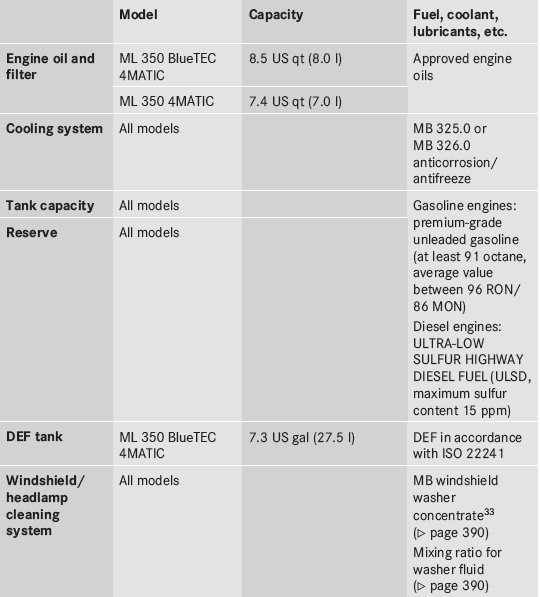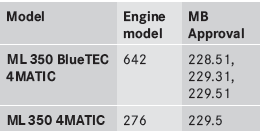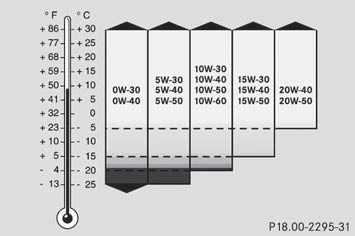Service products and capacities
Important safety notes
Service products include the following:
- fuels (e.g. gasoline, diesel)
- additives for exhaust gas aftertreatment (DEF)
- lubricants (e.g. engine oil, transmission oil)
- coolant
- brake fluid
- windshield washer fluid
Vehicle components and their respective lubricants must match. You should therefore only use products that have been tested and approved by Mercedes-Benz.
Information on tested and approved products can be obtained at a Mercedes-Benz Center or on the Internet at http://www.mbusa.com (USA only).
 WARNING
WARNING
Comply with all valid regulations with respect
to handling, storing and disposing of service
fluids. Otherwise, you could endanger
persons or the environment.
Keep service fluids out of the reach of children.
For health reasons, you should prevent service fluids from coming into direct contact with your skin or clothing.
If a service fluid is swallowed, contact a physician immediately.
Capacities
Missing values were not available at time of going to print.

Fuel
Important safety notes
 WARNING
WARNING
Gasoline and diesel fuels are highly flammable
and poisonous. They burn violently and can
cause serious injury.
Never allow sparks, flames or smoking materials near gasoline or diesel fuel!
Turn off the engine before refueling.
Whenever you are around gasoline or diesel fuel, avoid inhaling fumes and any skin or clothing contact. Extinguish all smoking materials.
Direct skin contact with fuels and the inhalation of fuel vapors are damaging your health.
Premium-grade unleaded gasoline

To ensure the longevity and full
performance of the engine, only premiumgrade
unleaded gasoline may be used.
If there is no premium-grade unleaded gasoline available and regular-grade unleaded gasoline may be used; please observe the following precautions: - only fill the fuel tank to half full with regular-grade unleaded gasoline and fill the rest with premium-grade unleaded gasoline as soon as possible.
- do not drive at the maximum speed.
- avoid sudden acceleration.
- if the vehicle is carrying a light load, e.g. two passengers without luggage, do not allow the engine to rev above 3,000 rpm.
- if the vehicle is fully loaded or is being operated in mountainous terrain, do not depress the accelerator pedal further than 2/3 of the pedal travel.
Flexible fuel vehicles
Important safety notes
Flexible fuel vehicles can be recognized by the sticker on the inside of the filler flap.
Flexible fuel vehicles can be operated with premium-grade unleaded gasoline and ethanol (E85) or a mixture of both. Ethanol fuel (E85) is a mixture of approximately 85% ethanol and 15% unleaded gasoline.
 WARNING
WARNING
Ethanol fuel (E85) and its vapors are highly
flammable, poisonous and highly
combustible. Ethanol fuel causes serious
injury if it ignites, if it comes into contact with
your skin or if you inhale the vapors. Avoid
inhaling ethanol vapors and ethanol coming
into contact with your skin. Before refueling,
extinguish all naked flames. Never allow
sparks or smoking materials near ethanol.
Changing the fuel type
For best performance and drivability, it is recommended that you use either one or the other fuel. Avoid alternating regularly between the two different types of fuel.
When changing between the fuel types, ensure that the following conditions are met: - the fuel level is below half full.
- the fuel level is above the reserve level. This is identifiable by the fuel tank reserve warning lamp not being lit.
- you add more than 5 gallons (20 liters) of fuel.
- you switch off the engine before refueling.
- the engine is started and runs for at least five minutes immediately after refueling.
These precautions should prevent the possibility of engine difficulties arising from changing to a different fuel type.
If the engine still doesn't run correctly, refuel with at least 3 US gal (12 l) of premium-grade unleaded gasoline. This may improve the running of the engine.
Fuel consumption
Ethanol (E85) contains less energy per gallon than gasoline. To ensure that the engine performance with ethanol (E85) is similar to that when using gasoline, the engine must burn more ethanol. As a result, it is to be expected that fuel consumption will increase when using ethanol fuel (E85), compared to gasoline.
Maintenance
Inform your authorized Mercedes-Benz Center that you are operating or have operated the vehicle with ethanol (E85).
Low outside temperatures
Starting times may significantly increase at temperatures below 32 °F (0 °C ). At low outside temperatures, Mercedes-Benz recommends the use of an auxiliary heater.
For further information, consult an authorized Mercedes-Benz Center.
Rough idling may also be experienced at low outside temperatures until the engine is fully warmed up.
Ethanol (E85) is unsuitable for use if outside temperatures fall below 14 °F (-10 °C ).
High outside temperatures
At outside temperatures above 95 °F (35 °C ), the time required for the starting procedure may increase and be accompanied by rough idling following the start.
Fuel requirements
Gasoline engines
Use only premium-grade unleaded gasoline.
The octane number should be at least 91.
Details can be found on the gas pump. The octane number is the average value of the Research Octane Number (RON) and the Motor Octane Number (MON): (RON + MON) / 2, also known as knock resistance.
Reformulated gasoline (RFG) and/or unleaded gasoline with additives can be used.
However, the concentration of additives in the fuel must be less than 10%, e.g.
- Ethanol
- TAME
- ETBE
- IPA
- TBA
For MTBE, the concentration should not exceed 15%.
The concentration of methanol in gasoline including other additives must not exceed 3%.
Using mixtures of methanol and ethanol is not permitted. Gasohol, a mixture of 10% ethanol and 90% unleaded gasoline, can be used.
All of these mix fuels must fulfill the fuel
requirements, e.g.:
- knock resistance
- boiling point
- vapor pressure
Diesel engines – important safety notes

Only use commercially available ULTRALOW
SULFUR DIESEL FUEL (ULSD, 15 ppm
MAXIMUM SULFUR) that meets the
ASTM D975 standard. Failure to use
ULTRA-LOW SULFUR DIESEL FUEL (ULSD)
can severely damage the vehicle's exhaust
gas aftertreatment system.

Do not fill the tank with gasoline. Do not
blend diesel fuel with gasoline or kerosene.
Otherwise, the fuel system and the engine could be damaged.
To prevent malfunctions, diesel fuel with improved flow characteristics is available in the winter months. Check with your gas station.
Information on the fuel grade can usually be found on the gas pump. If the information cannot be found on the gas pump, ask the gas station personnel. For further information, consult an authorized Mercedes-Benz Center or go to the Internet site http://www.mbusa.com (USA only).
Diesel engines – fuels containing biodiesel (FAME [fatty acid methyl ester])
Mercedes-Benz USA approves the use of B5 for all diesel engines with common rail direct injection (CDI) and BlueTEC. The concentration of bio-diesel in ULSD may be a maximum of up to 5% by volume.
Pure bio-diesel and diesel fuels that have a higher concentration of bio-diesel, e.g. B20, can damage the fuel system and the engine.
They are therefore not approved.
For further information, please ask the gas station personnel. The label on the gas pump must indicate clearly that the B5 bio-diesel blend fulfills the ULSD standard. If the label is not clear, do not refuel the vehicle.
Do not refuel your vehicle with fuels unless they have been approved by Mercedes-Benz.
Additives in gasoline
One of the main problems of poor fuel quality is the forming of deposits that are created during the gasoline combustion process.
Mercedes-Benz recommends that you use fuel brands that have the additives.
Deposits may form if you use fuels without additives over a longer period of time. These deposits are most likely to form on the inlet valves and in the combustion chamber.
This could lead to engine problems, e.g.:
- longer engine warm-up phase
- uneven idle
- engine noise
- misfiring
- loss of power
Carbon deposits may form if the availability of gasoline with relevant additives is insufficient (in certain regions). In this case, Mercedes-Benz recommends the use of additives that have been approved for Mercedes-Benz vehicles.
Consult an authorized Mercedes-Benz Center or go to the Internet site http://www.mbusa.com (USA only) for a list of approved products. Comply with the instructions for use on the product label.
Do not mix other fuel additives with fuel. This causes unnecessary costs and could damage the engine.

Do not refuel with low-grade fuel and do
not use fuel additives that are not tested
and approved for Mercedes-Benz vehicles.
Damage to or malfunctions of the fuel system may otherwise occur.
DEF
Important safety notes

For BlueTEC vehicles only.
DEF is a non-flammable, non-toxic, colorless, odorless and water-soluble fluid.

Rinse surfaces that have come into
contact with DEF immediately with water or
remove DEF using a damp cloth and cold
water. If the DEF has already crystallized,
use a sponge and cold water to clean it. DEF
residues crystallize after time and
contaminate the affected surfaces.
High outside temperatures
If DEF heats up to over 122 °F (50 °C ) for extended periods, e.g. as a result of direct sunlight on the DEF reservoir, DEF can decompose. Ammonia vapors develop as a result.
 WARNING
WARNING
When opening the filler cap of the DEF tank
ammonia gas vapors may escape. Refill DEF
in a well ventilated area only. Ammonia gas
vapors have a pungent odor and are
particularly irritating for your skin, mucous
membranes, and eyes. Inhaling ammonia gas
vapors will cause burning eyes, nose, and
throat, as well as coughing and watering eyes.
Low outside temperatures
DEF freezes at a temperature of approximately 12 °F (–11 °C). The vehicle is equipped with a DEF preheating system when it leaves the factory. Winter operation is therefore also guaranteed at temperatures below 12 °F (–11 °C).
Additives

Only use DEF in accordance with ISO
22241. Do not use additives with DEF and
do not dilute DEF with water. This may
destroy the BlueTEC exhaust gas
aftertreatment system.
Purity
Assuring the purity of DEF is particularly important with respect to avoiding malfunctions in the exhaust gas aftertreatment system.
If DEF is pumped out of the DEF tank, e.g.
during repair work, it must not be returned to the tank. The purity of the fluid can no longer be guaranteed.

Impurities in DEF (e.g. due to other
service products, cleaning agents or dust)
lead to:
- increased emission values
- damage to the catalytic converter
- engine damage
- malfunctions in the BlueTEC exhaust gas aftertreatment system
Engine oil
Please bear the following in mind
The engine oils are matched to the performance of Mercedes-Benz engines and service intervals. You should therefore only use engine oils and oil filters that are approved for vehicles with maintenance systems.
For a list of approved engine oils and oil filters, consult an authorized Mercedes-Benz Center or go to the Internet site http://www.mbusa.com (USA only).

Never use engine oil or an oil filter of a
specification other than is necessary to
fulfill the prescribed service intervals. Do
not change the engine oil or oil filter in
order to achieve longer replacement
intervals than those prescribed. You could
otherwise cause engine damage or damage
to the exhaust gas aftertreatment.
Follow the instructions in the service interval display regarding the oil change.
Otherwise, you may damage the engine and the exhaust gas aftertreatment.
The table shows which engine oils have been approved for your vehicle.


MB approval is indicated on the oil
containers.
Additives

Do not use any additives in the engine oil. This could damage the engine.
Engine oil viscosity
Viscosity describes the flow characteristics of a fluid. If an engine oil has a high viscosity, this means that it is thick; a low viscosity means that it is thin.
Select an engine oil with an SAE (viscosity) classification suitable for the prevailing outside temperatures. The following table shows the correct SAE classification to be used. The low-temperature characteristics of engine oils can deteriorate significantly, e.g. as a result of aging, soot and fuel deposits. It is therefore strongly recommended that you carry out regular oil changes using an approved engine oil with the appropriate SAE classification.

Refrigerant of the air-conditioning system
The air-conditioning system is filled with R134a refrigerant and a special PAG lubricant.

Never use refrigerant R 12 (CFC) or
mineral lubricants. Otherwise, you could
damage the air-conditioning system.
Brake fluid
 WARNING
WARNING
Over a period of time, the brake fluid absorbs
moisture from the air; this lowers its boiling
point.
If the boiling point of the brake fluid is too low, vapor pockets may form in the brake system when the brakes are applied hard (e.g. when driving downhill). This would impair braking efficiency.
You should have the brake fluid renewed at regular intervals. The brake fluid change intervals can be found in the Service Booklet.
Only use brake fluid approved by Mercedes- Benz. Information about approved brake fluids can be obtained from any authorized Mercedes-Benz Center or on the Internet at http://bevo.mercedes-benz.com.
Coolant
Important safety notes
The coolant is a mixture of water and
antifreeze/corrosion inhibitor. It performs
the following tasks:
- corrosion protection
- antifreeze protection
- raising the boiling point
The engine cooling system is filled at the factory with coolant that contains an antifreeze/corrosion inhibitor that ensures protection down to approximately -35 °F (-37 °C).

Only add coolant that has been premixed
with the desired antifreeze protection.
Otherwise, the engine could be damaged.
Further information on coolants and on filling can be found in the Mercedes-Benz Specifications for Service Products, MB Approval 310.1, e.g. on the Internet at http://bevo.mercedes-benz.com. You can also consult an authorized Mercedes-Benz Center.

Always use a suitable coolant mixture,
even in countries where high temperatures
prevail.
Otherwise, the engine cooling system is not sufficiently protected from corrosion and overheating.
If the coolant has antifreeze protection down to -35 °F (-37 °C), the boiling point of the coolant under operating conditions is approximately 266 °F (130 °C).
Your vehicle has a range of aluminum components. Aluminum components in the engine make it necessary to use antifreeze/corrosion inhibitor coolant that has been specifically formulated to protect the aluminum parts. Using other antifreeze/corrosion inhibitors without these characteristics affects the service life.
The coolant must be used throughout the year in order to maintain the necessary corrosion protection and to provide protection from overheating. In the Service Booklet, you can find information on the intervals for renewal.
The renewal interval is determined by the coolant type and the engine cooling system design. The renewal interval in the Service Booklet is only valid if the coolant is renewed or filled up with Mercedes-Benz approved products. Therefore, only use MB 325.0 or 326.0 anticorrosion/antifreeze or another Mercedes-Benz approved product of the same specification.
Information on other products with the same specifications that are approved by Mercedes-Benz can be obtained at an authorized Mercedes-Benz Center or on the Internet at http://bevo.mercedes-benz.com.
The coolant is checked at every maintenance interval at an authorized Mercedes-Benz Center.
The antifreeze/corrosion inhibitor
concentration in the engine cooling system
should:
- be at least 50%. This will protect the engine
cooling system against freezing down to
approximately -35 °F (-37 °C ).
- not exceed 55% (antifreeze protection to -49 °F [-45 °C ]); otherwise, heat will not dissipate as effectively.
If the coolant level is too low, MB 325.0 or 326.0 anticorrosion/antifreeze should be added. Have the engine cooling system checked for possible leaks.
Windshield/headlamp cleaning system
 WARNING
WARNING
Washer solvent/antifreeze is highly
flammable. Do not spill washer solvent/antifreeze on hot engine parts, because
it may
ignite and burn. You could be seriously
burned.
Use MB SummerFit windshield washer concentrate at temperatures above freezing:
– Mix 1 part MB SummerFit with 100 parts water.
Use MB WinterFit windshield washer concentrate at temperatures below freezing: – At temperatures down to 14 °F (- 10 °C): mix 1 part MB WinterFit with 2 parts water.
– At temperatures down to - 4 °F (- 20 °C): mix 1 part MB WinterFit with 1 part water.
– At temperatures down to - 20.2 °F (- 29 °C): mix 2 parts MB WinterFit with 1 part water.

Only SummerFit and WinterFit can be
mixed. Otherwise, the jets could become
blocked.
See also:
Cornering light function
The cornering light function improves the
illumination of the road over a wide angle in
the direction you are turning, enabling better
visibility in tight bends, for example. The
cornering light ...
Refueling
Important safety notes
WARNING
Gasoline and diesel fuels are highly flammable
and poisonous. They burn violently and can
cause serious injury.
Never allow sparks, flames or smoking
materials ne ...
Cup holder
Important safety notes
WARNING
If objects in the passenger compartment are
stowed incorrectly, they can slide or be
thrown around and hit vehicle occupants.
There is a risk of injury, particula ...
